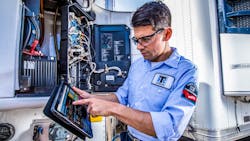How connected fleet assets improve trailer diagnostics and fleet uptime
Data influences many everyday decisions when it comes to fleet uptime. Quality data helps fleets around the world increase efficiency, detect potential issues and determine timely maintenance practices. Today’s fleets are under increasing pressure to improve productivity, and many rely on data from their transport management systems to direct their operations.
Telematics solutions are an integral part of a fleet’s “big data” picture. When telematics solutions are enabled, they open a window into the real-time operations of the fleet and provide critical visibility for items such as temperature-sensitive cargo and equipment over the road. This provides a more comprehensive assessment of the fleet.
Data and improved maintenance
Depending on the size of the company, multiple stakeholders – from operations to maintenance – utilize data, but their needs and how the data is used can vary greatly. The true value of the data is realized when fleets have access to actionable data to make sound decisions and improve response times to issues.
Traditionally, when a driver runs into an issue with their tractor or trailer, they have to call a dealer or support team to report the issue. From there, the unit typically needs to be taken into a service center, or a service truck dispatched to the driver’s location. This is an example of reactive maintenance.
A number of OEMs have introduced products which allow customers the ability to use proactive maintenance strategies to increase uptime and minimize service call times.
Products available to monitor the tractor or trailer, combined with integrated telematics solutions, allow dealers and service centers to pull data from the cloud and diagnose issues before trucks arrive at the dealership, or a service truck is sent out in the field.
This type of diagnosis helps minimize service times because the service provider has information about the issue and can have parts available if necessary, before the vehicle arrives at the shop.
As it relates to trailer monitoring and telematics, products such as Thermo King’s TracKing can integrate information such as temperature data, refrigeration unit operating parameters and trailer locations to give fleets the ability to monitor critical cargo and their equipment through the dispatch process from pickup to delivery.
Temperature parameters, alarm alerts, door status and fuel level notifications are where fleets often find the greatest value. These notifications help fleets monitor unauthorized or extended usage of their trailers, as well as manage fuel usage and costs.
Data integration and unit health monitoring
Proactive and preventive maintenance practices not only save valuable time, they also take the unknown out of maintenance pricing so fleets can better control cost and efficiency.
The ability to remotely download the information in order to get a more in-depth view of equipment health using telematics systems further enhances maintenance efficiencies and asset uptime.
Telematics solutions data integration can increase cargo protection, improve asset utilization and increase fleet uptime. Moreover, proactive maintenance strategies help to save fleets time and resources on the road.
When engine hours and alarms are integrated into fleet maintenance management systems, it improves equipment maintenance planning and scheduling, and is another good example of how to fully optimize telematics data.
Because no two fleets are alike, data integration needs to be customized. It is important to partner with a telematics solutions provider that understands the vital role data plays in timely diagnostics. Telematics data provides fleets access to powerful and actionable information to efficiently run their fleet and improve operations.
Fleets should work with providers of their transport management systems and telematics solutions to ensure that integrated data is customized in their systems to meet the fleet’s specific needs.
Shilpa Anand is the senior product manager for the Thermo King TracKing portfolio. She works closely with product management, sales and dealer teams to develop telematics solutions that meet the needs of today’s fleets. Previously, Anand played an integral role on other major product development teams within the company, including standardizing telematics solutions on all Thermo King Precedent refrigeration units in early 2018.
